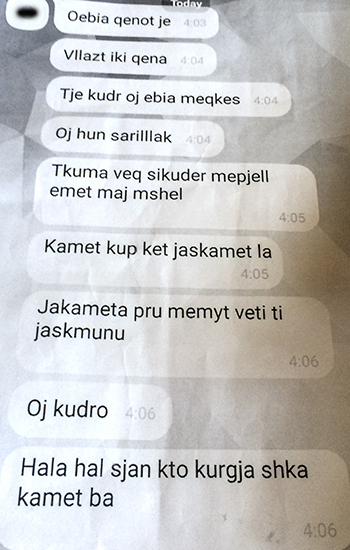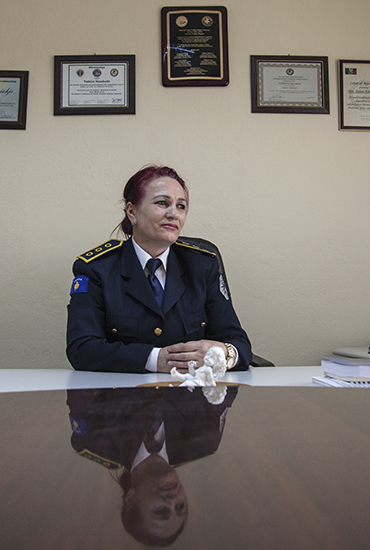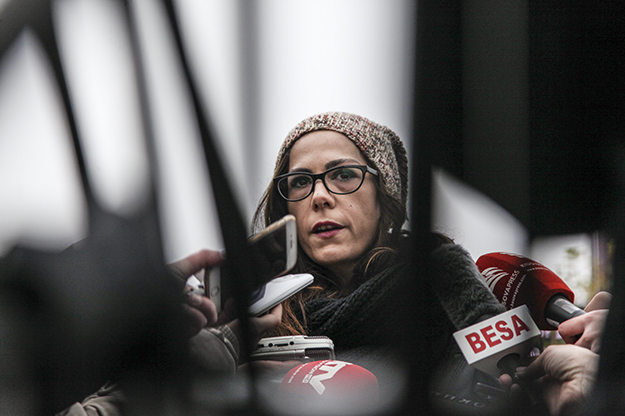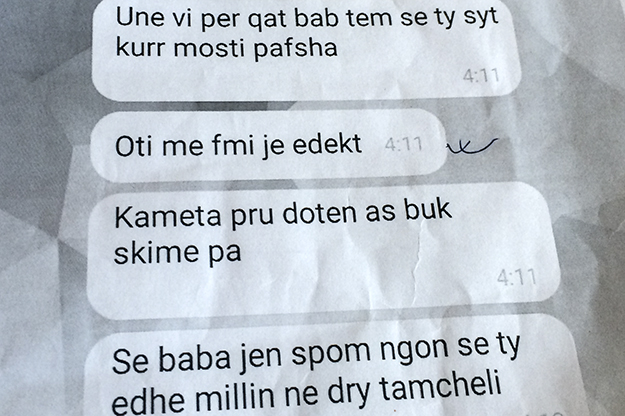Throughout much of the past decade, Nexhmie* regularly feared that her husband would kill her. One morning during Eid festivities, he hit her with a fire iron; to explain to guests why she was limping heavily, she said that she had tripped. On another occasion, he threw a chair at her. Once, in front of their children, he threatened to kill her with a knife.
Nexhmie was in her early 20s when she wedded Avni* in 2004 in an arranged marriage. Their families live in villages close to each other, as she says, “separated only by a hill,” around half an hour away from the capital.
Although her marriage wasn’t immediately violent from the start, it was always constraining. From dusk until dawn, her routine and movement would be limited around the household, and she would only leave the house to visit her family. In fact, it was following one such visit, during her third year of marriage, that Nexhmie’s life would turn into a struggle for her physical and psychological well being — and that of her children.
She recalls the heavy winter snowfall when Avni dropped her and their children for a visit at her parents’ house. Days and weeks passed by, and Avni didn’t come to pick them up as usual; he would send her occasional messages telling her not to leave the house amidst the harsh weather.
When Nexhmie returned home around two months later, she found herself an unwelcome stranger in front of her husband and his extended family. When she would do or say something, prepare a meal, serve tea, clean or move through the house, her words and actions were met with intimidation and insults. Soon after, she was told that she wasn’t needed anymore since Avni now had a new wife. She came to understand that during her stay at her parents’ house, Avni had started traveling to Germany for work, and while there, had married a German citizen — while Nexhmie and Avni had had a traditional wedding ceremony, like many couples, they had never completed the paperwork to become legally married.

Nexhmie suffered systematic abuse from her husband for years, ranging from insults and threats, to physical violence.
Then one night, Avni entered the bedroom where she was with their children, and started to beat them all severely — it was the first time that he had physically assaulted them and it came at a time when she was pregnant with their third child.
When thinking back to the years of her life that followed, Nexhmie has flashbacks of systematic violence committed against both her and their children. And her days were no easier when Avni was away in Germany. She says that before nightfall, she would lock herself and the children inside the bedroom to escape the assaults that continued from her husband’s family.
“‘We will kill your mother and will take you to the orphanage,’” she recalls her father-in-law telling the children on one occasion. “‘Even the orphanage won’t take you.’”
While Nexhmie says Avni’s extended family were aware of — and complicit in — the treatment towards her and the children, she didn’t say a word to her own family. “I thought that if I told my father, he would come and take me but that my children would stay there,” she says. “I didn’t know that I could take my children to my father’s house. I would just tell myself ‘be patient, be patient because if I leave they will kill my children.’”
Despite the proximity of her family to her husband’s house, Nexhmie claims that she was allowed to go to her parent’s house just two or three times a year. At times when her father or brother would come to visit her, Avni would beat her beforehand, and threaten to kill her and her family if she tried to go to the police.
In 2014, she suffered a breakdown and was hospitalized. As she was lying in the hospital bed on an intravenous drip, Avni called her from Germany. Her nephew, sitting at her bedside, turned on the speakerphone. “Where are you whore?” came the voice at the other end. “You went to the hospital to whore around. I will come and massacre you. I will cut off your head first, and then the heads of the others who took you there.”
Her nephew, doctors and the other patients in the room were appalled, but Nexhmie had never felt more relieved as she was finally able to share her experience with others. Like many victims of domestic violence — who, according to research often suffer from anxiety, fear and post-traumatic stress — she was diagnosed with deep depression, but now with the support of family and doctors, it was a battle that she no longer had to fight alone.
Reporting the abuse
The first point of contact for the majority of domestic violence victims who report abuse in Kosovo is the police. Perching atop the desk in Tahire Haxholli’s office at Kosovo Police’s headquarters in Prishtina is a small statuette of an angel. “A victim of domestic violence gave it to me after helping her to get out of a long abusive relationship,” explains the woman who has headed the Domestic Violence Investigation Units since 2008.
Haxholli is often the first person with whom victims running from abusive households in Kosovo speak to about their trauma. Last year 1,227 Kosovars — over 90 percent of whom were women — reported having suffered domestic violence to police; however the actual number of people suffering domestic violence is likely to be under-reported, with the majority of victims only going to the authorities if they have experienced violence over many years.
“It means that we don’t actually know how much violence there is inside the family,” says Haxholli, explaining that Kosovars only tend to report violence when they consider that it has become “too violent, serious and intolerable.” According to Haxholli, violence becomes so unbearable that it impacts the victim “at the bottom of her soul.”

Tahire Haxholli heads Kosovo Police’s Domestic Violence Investigation Units, whose officers are specially trained to handle domestic violence cases. Photo: Majlinda Hoxha / K2.0.
The majority of testimonies that Haxholli hears follow a similar pattern of a chain of violence against women inside the household: A victim is denigrated through physical and psychological violence while having her freedom of movement repeatedly violated — she has often been humiliated, threatened and physically beaten.
“She will have been called different [offensive] names — she will always have been told that she is incapable. She will have suffered psychological violence, economic [violence], her freedoms will have been limited … Economic violence is because she wouldn’t have had the money to buy the things she wanted. She will have been given the money and told ‘you can spend this much.’ She is always controlled, with all forms of violence. Many of them also experience sexual violence, but they don’t report it.”
Haxholli explains that when it comes to domestic violence, many women don’t know their basic rights. “The victim is told, ‘You can’t go anywhere, I know everyone, I have my people in the police and nobody will believe you,’” Haxholli says. “They don’t have knowledge of the institutions, laws and they believe everything that their husbands — the perpetrators of the domestic violence — tell them.”
It’s not only victims of domestic violence that are often in the dark when it comes to understanding their rights. An extensive report on attitudes and institutional responses to domestic violence published last year by Kosovo Women’s Network (KWN) shows that generally victims, citizens and institutions don’t comprehend what domestic violence is, as defined by Kosovo law. Under the Law on Protection Against Domestic Violence, acts of domestic violence range from physical violence to insults and offending. However, verbal abuse and even slaps often tend to be considered as ‘normal occurrences’ inside of a family.
The research found that while there is a tendency to believe that violence occurs more in poor, rural families, there is no statistically significant relationship between experiencing violence and geographic location, and no significant relationship was found between domestic violence and years of schooling completed — women of all economic and educational backgrounds were found to be subject and prone to domestic violence.
However, Haxholli says that most of the women who report domestic violence come from the cities and don’t have higher education. “It doesn’t mean that the violence doesn’t occur in the villages, but the possibility of approaching institutions is lower,” Haxholli says. “In the city, there will be someone who will help the victim to come to the police, or the victim will see the police station.”
If complaints are made to police outside of the courts’ regular working hours, they have the power to issue a Temporary Emergency Protection Order, which provides for the removal of the perpetrator from the house in which the victim resides. However Haxholli says that in 2016, only three women requested the order, largely because victims tend to live with their husband’s extended family and they don’t want to have to go back to a household in which they will be scolded for the son’s removal.
After reporting abuse to police, rather than return to a house in which they may be additionally suffering domestic violence from the husband’s family, Haxholli says that victims tend to prefer being taken to shelters.
Ongoing struggle
In 2016, after more than a year of finding temporary solutions, Nexhmie took her children and moved to an apartment paid for by the municipality. But her troubles didn’t end there. Last summer as she was leaving a shop with her children, sister and mother, her father-in-law and brother-in-law stopped her in an attempt to take her children. As many observers looked on and the situation grew tense with the old man throwing insults at her and threatening her with a stick, the police showed up.
“The police just stopped him from chasing us, smiled and shook hands with them,” Nexhmie says.
Despite police having established Domestic Violence Investigation Units consisting of a woman and a man in every municipality, such a response from regular frontline officers is not an isolated incident. According to the KWN report, while the specialist units headed up nationally by Haxholli have demonstrated knowledge of their responsibilities and duties, some officers consider domestic violence as acceptable in certain situations, claiming that violence must be serious in order for police to intervene.
“The police [that are trained in treating domestic violence cases] aren’t always the first to have contact with the victim,” says Adelina Berisha, advocacy coordinator at KWN. “An [untrained police officer] on shift can be called to go to the scene. And here is the danger because not all of them are trained and know how to approach the victim. That first meeting is very important, and it determines if the victim feels encouraged to report the violence to institutions, because the official might unconsciously discourage the victim.”

Adelina Berisha says that social workers often prioritize traditional notions of the family, over fulfilling their duty to protect women from domestic violence. Photo: Majlinda Hoxha / K2.0.
Two high profile deaths in recent years have highlighted how inefficiency in the justice system can be fatal for domestic violence victims, causing outrage and protests from women’s rights organizations. In 2011, Diana Kastrati was killed by her ex-husband after the courts failed to issue a restraining order against him that she had requested. The police came under scrutiny again in 2015 after the death of Zejnepe Bytyci-Berisha, who was stabbed to death by her husband. Bytyci-Berisha’s family claimed that she had reported violence against her to authorities 16 times, but that her requests for help had been ignored.
Activists and victims point out that the failure to take proper action extends beyond the judicial system and to Centers for Social Work, which as municipal-level public institutions have a duty to support and empower victims of domestic violence, and to ensure the wellbeing of children.
When KWN’s Berisha was participating in a protest march last October, following the public beating of a young girl from Rahovec, she was approached by a victim of domestic violence. The young woman told Berisha how social workers were pressuring her into getting back with her abusive husband and taking her child with her.
Berisha, says that this was an attitude that she frequently witnessed from social workers when she was helping to conduct interviews for last year’s research report.
“Often, they would say that the aim of their work is to protect the family, because ‘the family is sacred,’” says Berisha, highlighting that traditionally-influenced assumptions regarding the importance of the family are sometimes preventing officials from implementing their duty to safeguard women from violence. “If a woman is a victim, they will try to convince her to get back with her husband, because they will say ‘what will happen with these children?’”
After the event on the street with her in-laws, Nexhmie says workers from the Center of Social Work came to visit her in order to convince her to let her children visit their father’s family. She claims that the social workers gave her an automaton: if she didn’t convince her children to spend time with their father’s family, they would advise the court — at which she had applied for custody rights over the children — to take the children away from her. When she protested that the children had been traumatized by years of systematic violence, she says she was told that the damage needed to be repaired and that the grandfather must be allowed to see them.

After years of physical and emotional abuse against her and her children, Nexhmie left her husband last year, but her struggles are far from over.
With the help of legal advisers, Nexhmie approached a lawyer who helped her to take her case to court; firstly to request a Protection Order, in order to prevent her husband’s family from approaching her or the children, and secondly for custody rights. Her request for a Protection Order was granted, but she is still awaiting the first hearing in her custody rights case.
She is hoping that the bunch of documents and text messages containing threats and insults that she has saved, will help her to win the case and to build a new life with her children, away from the abusive household.
However, Nexhmie fears for their future. She has been told that there is no guarantee her municipal housing will be provided for longer than six months, and with no targeted support for domestic violence victims in terms of social assistance, social housing or vocational education to support their empowerment during reintegration into society, her future remains uncertain.
For now, Nexhmie occasionally stacks firewood in an attempt to earn some money during the cold winter, while she searches for a job as a restaurant dishwasher or supermarket cleaner.
“Anything, not to worry about feeding my children,” she says. “I just feel lucky that me and my children are alive.”K
This article is a response to multiple questions from readers regarding domestic violence during our #IWantToKnow campaign.
The#IWantToKnow campaign has been supported by the Embassy of the Netherlands in Kosovo.
* To protect the identity of the victim, the names Nexhmie and Avni are aliases.
Feature image: Majlinda Hoxha / K2.0.

